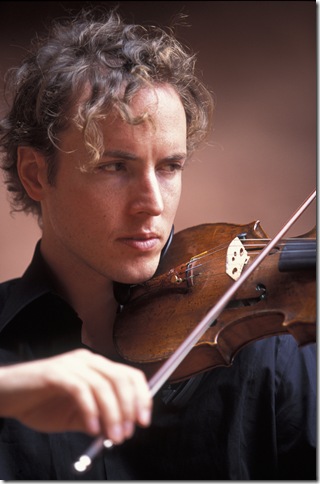There is a kind of intense, high-energy sound that is ideal for the special lyricism of Sergei Prokofiev, and Tim Fain has it.
The American violinist gave a riveting performance Sunday afternoon of Prokofiev’s Second Violin Concerto (in G minor, Op. 63) as the Boca Raton Symphonia opened its seventh season at the Roberts Theater.
Fain, 35, who’s been celebrated recently for his film work (Black Swan, Bee Season), his collaborations with Philip Glass and his ongoing multimedia project, Portals, is a violinist whose playing is very much of our time. It’s technically brilliant, directly communicative, and its focused tone has an edge to it that somehow sounds quintessentially contemporary.
Conductor Philippe Entremont led the orchestra in a relatively strong account of the concerto; in the first movement, the return of the opening music sounded appreciably better than it did the first time. But Fain gave the work a clear profile, from the snaky dark of the opening theme through its many measures of ostinato-style passagework, and he was in command every time he played.
Perhaps his most affecting playing came in the second movement, with its pizzicato dots-of-color accompaniment, and its soaring, retro-flavored theme. And he showed admirable crispness and rustic wit in the way he entered in the finale, giving it a nice, bumptious feel that lasted to the double bar.
At times, Fain would have been helped by tighter ensemble work from the Symphonia, which occasionally sounded ragged at the edges (the final bars of the concerto, for example). Overall, the orchestra came off somewhat under-rehearsed, particularly in the violins, whose presence was somewhat weak and whose unity was hit-and-miss.
In the Symphony No. 2 (in B-flat, D. 125), a marvelous early work by Franz Schubert that is redolent of Haydn, Mozart and Beethoven, Entremont began the fast section of the first movement very speedily indeed, and while that was exciting, it followed an introduction marred by woodwind intonation problems and shaky ensemble. That kind of thing hurts the effectiveness of Schubert’s transition from the stately to the athletic.
The very Mozartean theme of the second movement was noticeably better from the standpoint of violin cohesion, and the variations that came after put the spotlight on good contributions from the celli, the horns, oboe and clarinet. The minor-key minuet was pleasingly aggressive, but it also held together better on the return from the trio.
The finale had much of the same kind of headlong energy as the first, but it often seemed as though the violins were having trouble keeping up as a group, and there were several edge-of-seat moments when things appeared to be heading out of control.
It was a joy to hear this terrific piece, but this is an ensemble that needs more sectional rehearsals to tighten things up and give the music they play the polish it needs. That was evident as well in the opening piece on the program, the Serenata Notturna (K. 239) of Mozart, a charming piece of occasional music written in a style that was sometimes old-fashioned for its day, but no less engaging for all that.
The first movement suffered serious tuning problems, starting with the solo first violin, which was markedly flat the first couple times and then came up enough for agreement as the music went on. But the ending, too, was off, with the final chord nowhere near precise intonation.
The proceedings were more consonant in the second-movement Minuet, but in the Trio, the first and second solo violins, which play very different parts before coming together in a flutter of falling sixteenths, weren’t quite there, and this is music that needs to sound untroubled and casually elegant; here, it sounded more effortful.
The final movement, the best-known of the three, was better overall, with a good, amiable tempo and a stronger sense of ensemble that allowed the Symphonia to end with a flourish.
One hopes the Boca Symphonia finds a little more time in future concerts for rehearsals, because while this was a highly enjoyable concert in many ways (particularly from Fain), it was not all it could have been given the level of talent on stage. Now would be a good time to shore that up for the future, and bring the orchestra up to its full potential.
